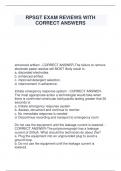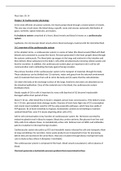Key definitions
Term Definition
Distribution of income How income is divided between rich and poor, or between groups in
society e.g. on a regional, age or gender basis.
Distribution of wealth How wealth is divided rich and poor, or between groups in society e.g.
on a regional, age or gender basis.
Income Personal or household income is the flow of money a person or
household receives in a particular time period.
Wealth Personal wealth is the stock of everything that a person or household
owns at a particular point in time which has value.
Equality When everyone is treated exactly the same. A complete equal
distribution of income means that everybody has the same income. It is
a positive concept.
Equity When everyone is treated fairly. It is a normative concept.
Transfer payment Is a payment of money for which goods or services are not received in
exchange e.g. pensions, universal credit.
Income
Income is a flow of money going to factors of production
1. Wages and salary’s paid to people
2. Money paid to people receiving benefits such as the state pension and tax credits
3. Profits flowing to businesses and dividends to shareholders
4. Rental income to people who own and lease property
5. Interest paid to owners of capital who hold money in deposit accounts or who
own bonds
Wealth
Wealth is stock that a person owns and has value at a certain point in time
1. Savings in a commercial bank deposit
2. Ownership of shares issued by stock market listed companies and equity stakes
in private businesses
3. Ownership of property
4. Wealth held in corporate bonds and government bonds
5. Wealth tied up in private (occupational) pension schemes and life insurance
schemes
The main difference between income and wealth
Earned Income Wealth
Flow Stock
Wages/ salary Historical accumulation of everything an
individual owns of some value
Some income can be saved -> first link Added to wealth
Second link-> the wealthier an individual is the more investment, income or unearned
income they gain which adds to their total income
Both income and wealth are mutually reinforcing (they are linked)
If you have a high income-> you will buy assets with surplus income-> assets generate
income-> any extra income can be spent on more assets
Therefore if you have high income you are likely to be wealthy
,How are the poor and rich affected by differences in income and wealth?
Factors that influence the
distribution of income and wealth
1 Factors of - How national income is distributed between land, labour,
production capital, enterprise and entrepreneurs
- Land owners (country estates)- top income quintiles
- Labourers- bottom quintile
- Labour’s share of worldwide income was 62% in 2000s down
from 66% in 1999.
- Partly because wages have not risen as fast as productivity.
- Profit and dividend payments to entrepreneurs have risen at
the expense of wages/salaries.
- Salaries of executive exception to the rule.
2 Distinction - Earned (employee wages, compensation, self employment
between income)
earned and - Unearned (interest and investment income e.g. dividend).
unearned
income
3 Wages and - different in hourly wage rate pilot vs a cleaner.
salary - Labour productivity of a pilot will be higher than that of an
differentials aircraft cleaner.
- Recently, more part-time and temporary jobs have been
available rather than full-time jobs- this leaves people
underemployed and it limits how much they can earn
- On average, those with a degree earn more over their lifetime
than those who gain just A levels
- Even with equal pay laws women still earn less than men on
average
- Workers may be discriminated against due to age, disabilities,
gender and race
4 Globalisation - UK low paid are in direct competition with incoming migrants
and from poorer countries or workers in foreign countries to which
international UK outsource.
migration of - Highly skilled executive are better at increasing their wages,
workers they move jobs if their pay does not rise.
, 5 Inequality in - distribution of wealth is more unequal distributed than income.
the - One in ten adults own around half of the nation's income, with
distribution of the top 1% owning 14% of UK wealth.
wealth - Wealth is accumulated over time or its inherited- you can’t
become wealthy overnight
6 Unemployme - This can cause relative poverty (and therefore increase income
nt inequality) and it is particularly detrimental where no one in a
household is working, since they are left to rely on state
benefits
7 Inequality - Globally here is inequality between countries
between - Some of this is caused by certain social groups being excluded
countries and marginalised based on ethnicity, gender, sexual orientation
and disabilities
- Some countries have been held back by wars, droughts,
famines and earthquakes which has kept their population in
poverty
- In some African countries population issues are complicating
efforts to reduce poverty and eliminate hunger
- There is vast inequality in opportunity between different
countries- they have different health, education systems,
infrastructure, life expectancy etc
- exploitation of the poor through colonial rule led to more
inequality between countries.
8 Education - the more qualifications someone has the greater the earning
potential is compared to other individuals
9 Age - the older someone is the greater their earning potential is because
they have more skills and experience
o They are also likely to have accumulated wealth over
time
10 Ownership of - Ownership of property - those who own property are going to be
property and extremely wealthy over time as the value of their property rises
financial assets o With property and financial assets the distribution of
wealth is made worse by inheritance because many
people inherit property or financial assets from wealthy
ancestors. As assets generate income the distribution of
income is also made worse off
- those who are able to purchase financial assets such as shares and
pensions are going to be more wealthy than those who cannot
o The employer has an impact on this, the stronger the
employer is the more likely they are to give workers
better access to good pension schemes
Income inequality in developed nations
Globalisation
Technology
Migration patterns (EU)
Skills/ training provision
Policies on direct/ indirect taxation




